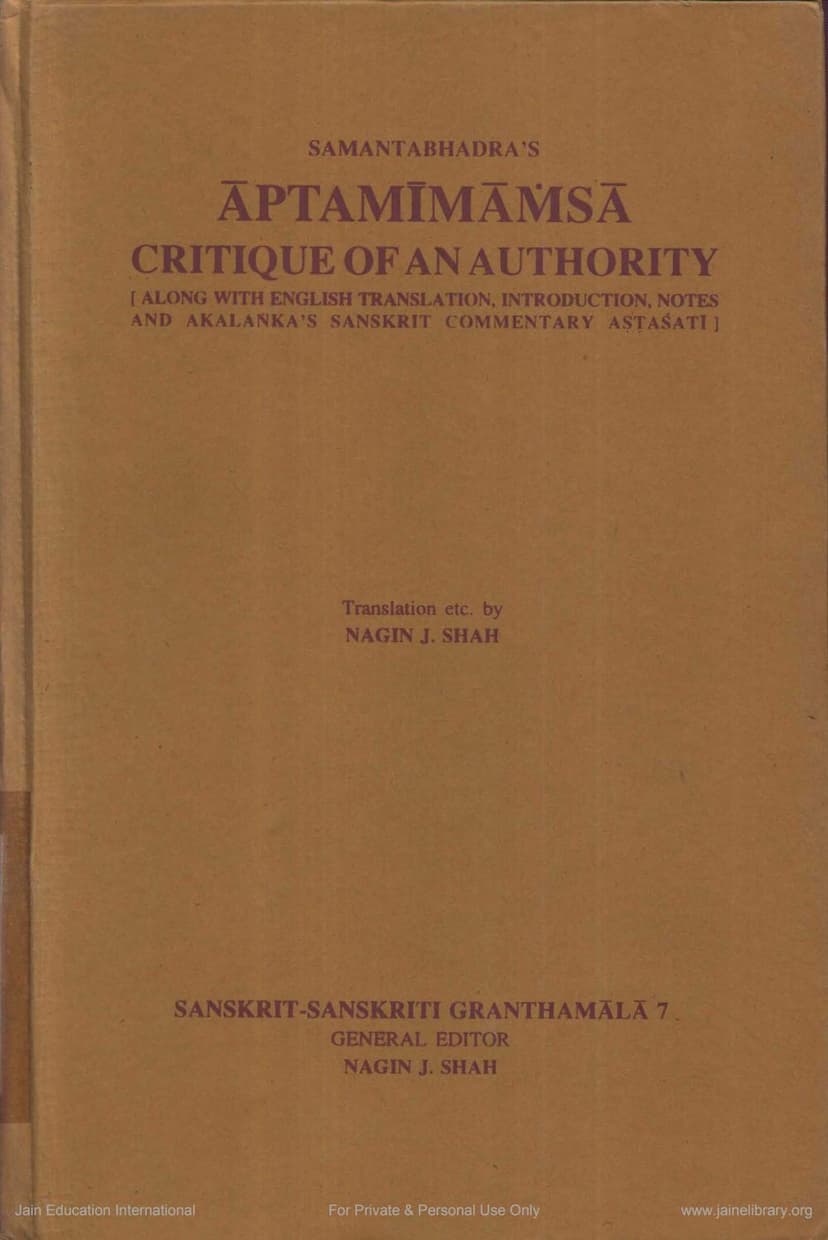Aptamimansa Critique Of An Authority Bhasya
Added to library: September 1, 2025

Summary
This document is the English translation, introduction, and notes of Samantabhadra's Aptamīmāṁsā: Critique of an Authority, along with Akalanka's Sanskrit commentary, Aṣṭasati. The work was translated and edited by Nagin J. Shah.
Here's a comprehensive summary of the content, focusing on the introduction and the core philosophical arguments presented in the Aptamīmāṁsā as discussed in the introduction and commentaries:
1. The Significance of Aptamīmāṁsā and Samantabhadra:
- Foundation of Anekānta Logic: Samantabhadra is credited with laying a firm foundation for Anekānta logic, the central philosophy of Jainism. His Aptamīmāṁsā served as a model for subsequent Jaina thinkers to critique one-sided philosophical views.
- Commentaries: The text is significant for being commented upon by prominent Jaina logicians like Akalanka (in his Aṣṭasati), Vidyānanda, and Yasovijaya.
2. Core Jain Philosophy: Nayavāda and Anekāntavāda:
- Anekāntavāda (Manysidedness): Reality is inherently complex and possesses infinite characters, including seemingly contradictory ones. A real thing is thus "anekānta" (manifold).
- Nayavāda (Theory of Standpoints): Due to the complexity of reality, ordinary beings can only grasp one aspect or character at a time. This partial understanding, or the judgment based on it, is called a "naya."
- Conditionality (Syāt): To avoid dogmatism, Jain philosophy uses the qualifier "syāt" (from a certain standpoint, in a certain sense) to indicate that a statement expresses only partial truth.
- Synthesis of Partial Truths: Anekāntavāda's goal is to synthesize these partial truths (nayas) into a comprehensive, whole truth. It is described as a "Philosophy of philosophies."
- Saptabhangi (Sevenfold Predication): This is a logical methodology developed to express the complex, many-sided nature of reality. It involves seven possible ways of predicating a character of a thing (e.g., it exists, it does not exist, it exists and does not exist, it is inexpressible, etc.).
3. Evolution of Anekāntavāda and Jain Philosophical Tradition:
- Early Traces: The doctrine of relative judgment (Nayavāda) is traceable to Jaina Āgamas.
- Logical Development: Siddhasena Divākara initiated the "age of Logic" by explicitly mentioning and criticizing non-Jaina philosophical schools, highlighting the importance of Anekānta. He synthesized views from Sānkhya and Buddhism.
- Akalanka's Contribution: Considered the "father of Jaina logic," Akalanka further developed and defended Anekāntavāda, critiquing Buddhist, Nyāya-Vaiśeṣika, Mīmāṁsā, and Sānkhya philosophies in his Aṣṭasati.
- Vidyānanda and Yasovijaya: These scholars built upon the foundation laid by Samantabhadra and Akalanka, offering comprehensive and sophisticated defenses of Anekāntavāda, engaging deeply with contemporary philosophical systems.
4. Structure and Subject Matter of Aptamīmāṁsā:
- The text contains 114 verses and is divided into ten sections, each addressing a particular philosophical problem (ontology, logic, epistemology, ethics).
- Each section typically presents two opposing "one-sided" philosophical theses and then offers the Jaina "synthesis" which aims to reconcile them.
5. Key Philosophical Debates Critiqued in Aptamīmāṁsā (as presented in the Introduction): The introduction details the ten sections, outlining the core debates and the Jaina position:
- Existence and Non-Existence: Critiques absolute existence and absolute non-existence, proposing a synthesis of both (exists from its own perspective, doesn't exist from another's).
- Oneness and Separateness: Critiques absolute oneness (monism) and absolute separateness (pluralism), proposing that entities are somehow one and somehow separate.
- Permanence and Transience: Critiques absolute permanence (e.g., Sānkhya) and absolute transience (e.g., Buddhism), proposing that entities have both permanent (substance) and transient (mode) aspects.
- Difference and Identity: Critiques absolute distinctness and absolute non-distinctness in relationships (e.g., cause-effect, quality-substance), proposing a conditional reconciliation.
- Dependence and Independence: Critiques absolute dependence and absolute independence in the relationship between an entity and its attributes.
- Reason and Scripture: Argues for the conditional authority of both inference (reason) and scripture.
- Pan-internalism and Pan-externalism: Critiques extreme subjective idealism (cognition is only internal states) and naive realism (cognition is solely reflection of objective reality), proposing a balanced view.
- Fate and Perseverance: Critiques the extreme positions of fatalism and pure self-effort, suggesting a synthesis where both play a role.
- Ethics of Virtue and Sin: Argues that virtue and sin are primarily determined by the purity or impurity of the mind, not solely by the external consequences of actions (pleasure/pain to self or others).
- Ignorance, Knowledge, Bondage, and Liberation: Proposes that bondage arises from delusion (moha) and liberation from freedom from delusion, rather than solely from degrees of ignorance or knowledge.
6. Relationship between Anekānta and Ahimsā (Non-violence):
- Anekāntavāda is presented as the intellectual extension of the principle of non-violence (Ahimsa).
- Just as Ahimsā advocates not harming others physically, Anekāntavāda promotes respecting the views of others and avoiding intellectual harm by refusing to claim one's own view as the absolute truth.
- It fosters an attitude of toleration and syncretism in philosophy.
Overall Purpose: The Aptamīmāṁsā, through its rigorous dialectical approach and the commentaries, aims to demonstrate the validity and superiority of the Jaina Anekānta viewpoint by systematically critiquing opposing absolutist philosophies. It highlights the manysidedness of reality and the necessity of nuanced, conditional assertions to understand it accurately. The work underscores the Jaina commitment to a comprehensive synthesis of philosophical truths, grounded in logic and ethical principles.